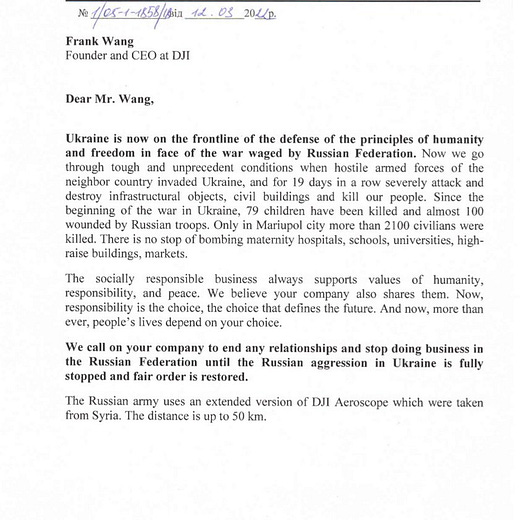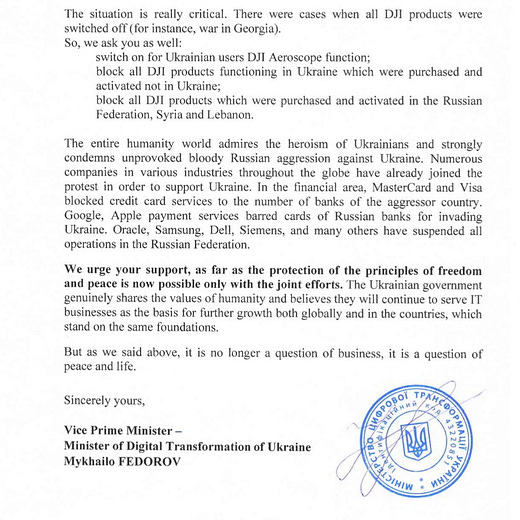DJI distances itself from Russia on Weibo
Top drone maker battles to stay in the good graces of the West
Before we go, as previewed on Pekingnology yesterday, Yang Liu on his Beijing Channel substack has a scoop: Elon Musk’s article on China Cyberspace, the flagship magazine of the Cyberspace Administration of China.
About 24 hours ago, the Russian embassy in China put out a post on Weibo, China’s equivalent of Twitter
俄罗斯前总参谋长巴鲁耶夫斯基将军:
✔️ 中国制造的普通商用四旋翼无人机给传统身管炮和火箭炮的应用带来了一场真正的革命,实际上彻底解决了炮兵侦察、目标指示和火力修正方面的老问题。
✔️当无人机持续悬停目标区上空进行调整时,火炮可以使用常规弹药,其精度和效率堪比精确制导弹药,同时杀伤所需的弹药和火炮数量大幅减少。
✔️ 中国大疆公司制造的Mavic四旋翼无人机原则上已成为现代战争的真正象征。
Translated as
General (Yury Nikolayevich) Baruyevsky, Former Russian Chief of General Staff :
✔️ imple Chinese-made commercial quadcopters have revolutionized the use of conventional cannon and rocket artillery, practically solving the old problems of artillery reconnaissance, target indication, and fire correction once and for all.
✔️ When drones continuously hover over the target area to make adjustments, artillery can use conventional munitions with accuracy and efficiency comparable to precision-guided munitions, while requiring significantly less ammunition and artillery to kill.
✔️ The Mavic quadcopter drone, made by China's DJI, has in principle become a true symbol of modern warfare.
The next afternoon, DJI, the privately-owned world’s largest manufacturer of commercial drones, commented on the post:
大疆所有产品均为民用目的设计,服务人们的生产生活,致力于造福社会,让生活变得更美好。大疆的产品不适合也不满足军事用途需求,我们不支持一切军事领域的应用。
Translated as
All DJI products are designed for civilian purposes, to serve people's production and lives, and are dedicated to benefiting society and making life better. DJI's products are not suitable and do not meet the needs of military use, and we do not support any applicatios in the military field.
The Russian embassy’s post probably originated in a Chinese-language report by Sputnik, the Russian news agency.
General Yury Nikolayevich Baruyevsky made those remarks in the preface of his new book Alien Wars – A New Paradigm, published on August 10 at the Centre for Analysis of Strategies and Technologies, the leading Russian defense industry and arms trade think tank.
Despite broadcasting in Chinese to the Chinese audience, the world’s preeminent drone maker is apparently aware it has an audience in the West, particularly given the ongoing war in Ukraine.
In March, Mykhailo Fedorov, Vice Prime Minister and Minister of Digital Transformation of Ukraine, publicly called on DJI to exit the Russian market during the war and handing over data over DJI drones in Ukraine.
DJI replied on Twitter the next day stressing using its products “for military missions is inappropriate” and adding “DJI cannot obtain user information and flight data, unless the user actively submits it to us. We do not have the ability to identify and verify a user’s location, and therefore we do not hold the data you requested.”
A month later, the Chinese drone maker announced suspending its business in Russia and Ukraine altogether
DJI is internally reassessing compliance requirements in various jurisdictions. Pending the current review, DJI will temporarily suspend all business activities in Russia and Ukraine. We are engaging with customers, partners and other stakeholders regarding the temporary suspension of business operations in the affected territories.
A private company making commercial products, DJI has already been thrown in the crosshairs of the U.S. comprehensive strategic competition with China.
Donald Trump’s administration placed it on the Department of Commerce’s entity list, barring it from buying U.S. technology.
Last year, Joe Biden’s administration put it on the Treasury Department’s list of Chinese military-industrial complex companies, banning U.S. investors to take financial stakes in them.
Last month, Demetri Sevastopulo reported for the Financial Times that the Shenzhen-based company is lobbying the U.S. Congress to block a bill barring the federal government from buying its drones.
…the DJI battle has shifted to the annual defence spending bill working its way through Congress. DJI appeared to win an early victory this week when the Democrat-controlled House rules committee opted not to include the drone language in the House version of the defence bill.
Still, there are many detractors in Congress and think tanks, one of whom is likely the source of the story.
But critics counter that Chinese national security laws require companies to share data with the central government when compelled by Beijing.
Their key argument is still Article 7 of China’s National Intelligence Law
Article 7 Any organization or citizen shall support, assist and cooperate with the state intelligence work in accordance with the law, and keep the secrets of the national intelligence work known to the public. The State protects individuals and organizations that support, assist and cooperate with national intelligence work.
Huawei and many other Chinese companies have worked hard in explaining this vague but sweeping article does not obligate them to work for the Chinese state in spying on foreigners.
According to two independent, international law firms Zhong Lun and Clifford Chance, Chinese law does not compel Huawei to install so-called “backdoors” in telecommunications infrastructure. The Ministry of Foreign Affairs of the People's Republic of China has also confirmed this claim is based on a misreading of China’s National Intelligence Law.
Clifford Chance reviewed an independent verification by Zhong Lun, which found the relevant articles of the Counter Espionage Law, the Anti-Terrorism Law, the Cyber Security Law, the National Intelligence Law, and the State Security Law do not empower PRC government authorities to plant so-called “backdoors,” eavesdropping devices or spyware in telecommunications equipment.
When asked if China would request a company to spy on other countries, Chinese Premier Li Keqiang told reporters that “this is not consistent with Chinese law. This is not how China behaves…we did not do that and will not do that in future.”
Huawei has never received such a request and we would categorically refuse to comply if we did. Huawei is an independent company that works only to serve its customers. We would never compromise or harm any country, organization, or individual, especially when it comes to cyber security and user privacy protection.
But the explanation has almost always fallen on deaf ears. Against deteriorating ties and deepening mistrust between China and the West, it’s almost certain that detractors will exploit the argument against companies from DJI to Bytedance’s TikTok.
In interpreting China’s Global Initiative on Data Security, Pekingnology recently argued Beijing had effectively promised not to ask Chinese tech companies for overseas data, because its own initiative states
States should not request domestic companies to store data generated and obtained overseas in their own territory.
States should respect the sovereignty, jurisdiction and governance of data of other States, and shall not obtain data located in other States through companies or individuals without other States' permission.
-Should States need to obtain overseas data out of law enforcement requirement such as combating crimes, they should do it through judicial assistance or other relevant multilateral and bilateral agreements.
But even if skeptics agree that Beijing had indeed made the promise, it would be a more difficult battle to convince them Beijing will implement it.
In the meantime, DJI and others will struggle to do whatever they can to stay in the good graces of the West - their key market and important source of technology.
As previewed on Pekingnology yesterday, Yang Liu on his Beijing Channel substack has a scoop: Elon Musk’s article on China Cyberspace, the flagship magazine of the Cyberspace Administration of China.









很好啊,我可以不用把我DJI的相机给扔了